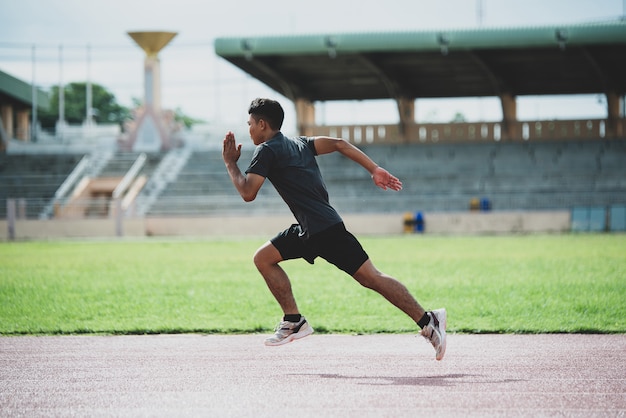Proteins to Enhance Athletic Performance
Protein for Athletes, how much is enough?

Athletes who spend most of their time in high-intensity performances like running sprints, swimming long distances, or lifting weights spend more energy than an average person, hence they need additional nutrients to perform an intense physical activity and meet the demands of training and exercise.
During sport-related activities, carbohydrates are employed by the muscles as their primary energy source. Whereas, protein plays a key role in the recovery and repair of the muscles.
Role of proteins
Proteins are nitrogen-containing substances that are made up of amino acids. They are the main structural component of muscle and other tissues within the body and are vital in the synthesis of hormones, enzymes, and hemoglobin.
Proteins and Athletic Performance
For athletes whether involved in resistance or strength training, protein is essential in the diet because:
Protein promotes sports performance, adaptation to an exercise, and recovery post an exercise. The balance between muscle protein breakdown and muscle protein synthesis is called Net Protein Balance (NPB). When there is a positive NBP achieved through more muscle protein synthesis, it promotes exercise recovery, adaptation, and anabolism.
Several studies have indicated that greater protein intake significantly improved protein synthesis in athletes involved in resistance training.
Protein aids in repairing and strengthening muscle tissue damaged by exercise.
Dietary protein is additionally essential for immune system maintenance and a healthy immune system is important for physical recovery from exercise because it helps in the tissue repair process.
Dietary proteins assist in building antioxidants that help detoxify the body and reduce sports-related problems including muscle fatigue.
A diet lacking in protein can increase protein catabolism and may slow recovery after an activity which results in muscle wasting, decreased ability to perform an activity, and overtraining.
Hence athletes have high protein requirements due to the need to preserve muscles, aid in recovery post sports activity, and to promote satiety
But how much protein is necessary?
To ensure a positive protein balance, it is necessary to consume a sufficient amount of protein. Competitive athletes require 1.5-2 g/kg of protein daily. Resistance exercise athletes, particularly bodybuilders, require up to 1.7 g/kg of proteins per day.
Type of Protein to Consider
The effectiveness of dietary protein is determined by its quality, digestibility, and efficiency in converting into muscle protein.

The International Society of Sports Nutrition has recommended the consumption of high-quality proteins, which contain all the 9 essential amino acids. For example, milk proteins like whey and casein, egg white, and soy protein isolate are readily utilized by the muscle to optimize protein balance and muscle protein synthesis.
Other sources of low fat, high-quality protein include animal foods like milk and milk products, skinless chicken meat, turkey, red meat, fish, etc.
Vegetarianism and Athletes

A variety of plant proteins, when combined to supply all of the essential amino acids, are an excellent source of protein and a healthier option than animal proteins that contain saturated fats. Soybean and lentils are rich in leucine, an essential amino acid that helps in muscle protein synthesis and promotes recovery of the muscles after exercise.
When to Eat Protein
Timing to consume protein is of essence to athletes because it is believed that post an event the muscles are sensitive to nutrient intake which can boost muscle protein synthesis and recovery.
It is recommended that proteins should be consumed every 3-4 hours for 6-8 meals per day in portions of 20-40 gm which improves body composition and performance in athletes.
Protein Supplements for Athletes
Since it becomes difficult to have a meal or snack during an event or right after a workout, protein supplements (protein powders, bars, drinks) are an effective way to achieve protein intake for athletes. Other than being convenient, they also aid in repair, recovery, growth of muscle, and weight management.
One of the most effective post-workout protein supplements is whey protein powder. Whey digests quickly hence reach muscles faster, provides a rich source of branched-chain amino acids (BCAAs) which enhances muscle protein synthesis and improves recovery of muscle function.
Blend in milk, smoothies, vegetables and have a fast fill of proteins.
The Takeaway
The protein requirements for an athlete are influenced by individual sport, type of training, intensity, duration, and dietary intake.
Dietary proteins are important for athletes to repair damaged tissues, stimulate muscle protein synthesis, and to boost the immune system
Along with proteins, athletes have to make sure they meet the needs for carbs and fat.
Eating high-quality protein within two hours after exercise enhances muscle synthesis and repair.
Protein powders are an easy way to increase protein synthesis for a prolonged duration in athletes.
Recipe for post-workout recovery
Strawberry Banana Milkshake (serves 1)
A perfect refreshment to replenish your proteins post-workout.
Ingredients
1 ½ scoop Whey Protein Powder
1 cup chopped strawberries
1 medium banana, chopped
1 cup milk (low fat)
1 tsp chia seeds
1 tsp honey (optional)
½ cup crushed ice
Method
Combine all the ingredients in a blender and blend to make the smoothie.
Served chilled
Nutritional Information (per serving)
Energy | 343 kcal |
Carbohydrates | 39 gm |
Protein | 40 gm |
Fat | 3 gm |
Fibre | 7 gm |

Comments
Post a Comment